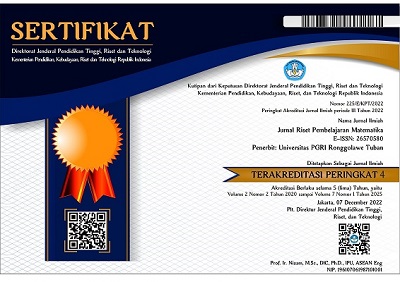PROFIL BERPIKIR ALJABAR SISWA SMP KELAS VII DITINJAU DARI KEMAMPUAN BERPIKIR LOGIS
DOI:
https://doi.org/10.55719/jrpm.v3i1.260Keywords:
berpikir aljabar, kemampuan berpikir logisAbstract
Algebraic thinking skills for students are important to improve in mathematics learning. Algebra is also closely related to other branches of mathematics. Because every branch of mathematics uses mathematical symbols. So it can be said that algebra is one of the keys to success in learning mathematics. The purpose of this study was to determine algebraic thinking skills in junior high school students in grade VII in terms of logical thinking skills. this type of research is a qualitative study. The subjects in this study consisted of 3 junior high school students in grade VII, each of whom occupied the abstract operasional stage, the transitional stage and the concrete operational stage which were determined through a logical thinking ability test (TKBL). After finding a subject that corresponds to the stage of logical thinking ability, the subject is given an algebraic thinking test. Data collection using written test collection using written test questions and interviews. The results of this study state that the subject of the abstract operational stage is good in algebraic thinking skills, the transitional skills and the concrete operational stage subject is lacking in algebraic thinking skills.
Downloads
References
Fadiana, M., Amin, S. M., Lukito, A., Wardhono, A., & Aishah, S. (2019). Assessment of seventh grade students’ capacity of logical thinking. Jurnal Pendidikan IPA Indonesia. https://doi.org/10.15294/jpii.v0i0.11644
Fadiana, Mu’jizatin. (2016). Perbedaan Kemampuan Menyelesaikan Soal Cerita antara Siswa Bergaya Kognitif Reflektif dan Impulsif. JRAMathEdu (Journal of Research and Advances in Mathematics Education). https://doi.org/10.23917/jramathedu.v1i1.1775
Fadiana, Mu’jizatin, & Citra Dewi Rosalina. (2020). Peningkatan Rasa Percaya Diri Siswa Tunagrahita Melalui Pembelajaran Terintegrasi Semiotik Dengan Media Buku Pop Up. Dinamisia : Jurnal Pengabdian Kepada Masyarakat. https://doi.org/10.31849/dinamisia.v4i2.3940
Fadiana, M. (2015). Math Learning Model that Accommodates Cognitive Style to Build Problem-Solving Skills. Higher Education Studies. https://doi.org/10.5539/hes.v5n4p86
Kincal, R. Y., & Yazgan, A. D. (2010). Investigating the Formal Operational Thinking Skills of 7th and 8th Grade Primary School Students According to Some Variables. Ilkogretim Online.
Lian, L. H., & Yew, W. T. (2011). Developing Pre-algebraic Thinking in Generalizing Repeating Pattern Using SOLO Model. US-China Education Review, 6, 774–780.
Miles, M. B., Huberman, A. M., & Saldana, J. (2014). Qualitative Data Analysis: A Methods Sourcebook. Third Edition. In The SAGE Handbook of Applied Social Research Methods.
Pratiwi, V., Nurketi, N., & Putri, F. C. (2020). Pengembangan Motion Comic Berbasis Kearifan Lokal dalam Berpikir Aljabar di Sekolah Dasar. VYGOTSKY. https://doi.org/10.30736/vj.v2i1.183
Setyawati, R. D., Nurbaiti, I., & Ariyanto, L. (2020). Analisis Kemampuan Berpikir Aljabar Siswa Kelas VIII Ditinjau Dari Self Efficacy. JIPMat. https://doi.org/10.26877/jipmat.v5i1.5517
Utami, R. E., Ekawati, C., & Handayanto, A. (2020). Profil Kemampuan Berpikir Aljabar Dalam Memecahkan Masalah Matematika Ditinjau Dari Gaya Kognitif Reflektif Siswa Smp. JIPMat. https://doi.org/10.26877/jipmat.v5i1.5502
Warsitasari, W. D. (2015). Berpikir Aljabar Dalam Pemecahan Masalah Matematika. APOTEMA : Jurnal Program Studi Pendidikan Matematika. https://doi.org/10.31597/ja.v1i1.161
Yanti, R. A. (2018). Analisis Kemampuan Berpikir Aljabar Siswa Berdasarkan Miskonsepsi. Optimalisasi Literasi Matematis Dalam Sudut Pandang Saintifik.
Zaelani, K. M., Warmi, A., & Ruli, R. M. (2019). Kemampuan Berpikir Aljabar Siswa SMP Dalam Menyelesaikan Masalah Aljabar Berbasis TIMSS. Prosiding Seminar Nasional Matematika Dan Pendidikan Matematika Sesiomadika.
Downloads
Published
How to Cite
Issue
Section
License
Penulis yang menerbitkan dengan jurnal ini menyetujui persyaratan berikut:
- Penulis mempertahankan hak cipta dan memberikan jurnal hak publikasi pertama dengan karya yang dilisensikan secara bersamaan di bawah Lisensi Internasional Creative Commons Attribution-ShareAlike 4.0 yang memungkinkan orang lain untuk berbagi karya dengan pengakuan kepenulisan karya dan publikasi awal di jurnal ini.
- Penulis dapat membuat pengaturan kontrak tambahan yang terpisah untuk distribusi non-eksklusif dari versi jurnal yang diterbitkan dari karya tersebut (misalnya, mempostingnya ke repositori institusional atau menerbitkannya dalam sebuah buku), dengan pengakuan publikasi awalnya di jurnal ini.
- Penulis diizinkan dan didorong untuk memposting karya mereka secara online (misalnya, di repositori institusional atau di situs web mereka) sebelum dan selama proses pengiriman, karena dapat menghasilkan pertukaran yang produktif, serta kutipan lebih awal dan lebih besar dari karya yang diterbitkan.









